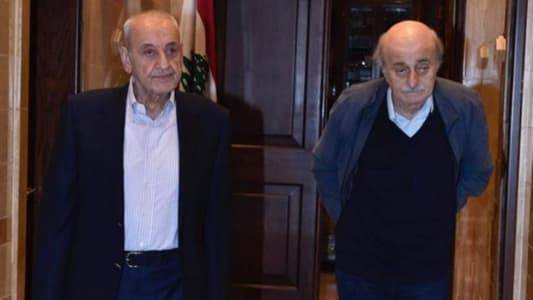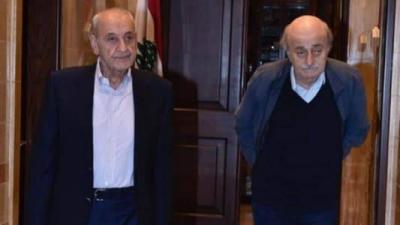It is rare for Lebanese Parliament Speaker Nabih Berri to differ with his historical ally, Walid Jumblatt, the head of the Progressive Socialist Party, on internal matters, as is the case now regarding the presidential elections. Continuous meetings between the two men have failed to soften each other's stance despite their "strategic" alliance. Berri, alongside Hezbollah, continues to support the candidacy of Sleiman Franjieh, the head of the Marada Movement, while Jumblatt, whose parliamentary bloc votes for MP Michel Moawad, firmly rejects the idea of having a president from the resistance camp who represents an extension of Michel Aoun's era.
Both sides are betting on time and the possibility of achieving a regional and international consensus to produce a presidential settlement, but neither will go into the elections without an agreement with the other or from a position of enmity. Evidence of this is Berri's refusal to call for a new electoral session before securing prior agreement on the name of the president.
Member of the "Democratic Gathering" bloc, MP Hadi Abu al-Hassan, points out that "the relationship between Walid Jumblatt and President Nabih Berri is 'historical,' stemming from their defense of Lebanon's Arab identity and their support for the Taif Agreement, despite occasionally differing on some internal issues." He believes that "the presidential file has other calculations that make us careful not to repeat the experience of electing Michel Aoun, which led the country to disasters and calamities."
Abu al-Hassan confirms to the "Middle East" that "the Progressive Socialist Party fought the last parliamentary elections based on a reform program and the sovereignty narrative, and we earned the public's trust on this basis; hence, we will not accept a president who represents an extension of the previous era." He adds, "We will not step away from our alliance with MP Michel Moawad to elect a candidate from the March 8 alliance, so Walid Bey has proposed new names in agreement with Moawad and all our allies, and we await consensus on one of these figures."
MP Qassem Hashem, a member of the "Development and Liberation" bloc, sees that "the balance of power in the parliament is clear and does not allow anyone to elect a president from their camp." Hashem emphasizes to the "Middle East" that "the historical relations between President Berri and Walid Jumblatt remain stable at critical junctures, despite some differences in perspectives." He stresses the need "to go to elect a president who is backed by internal and external agreements, which is the core of the open discussions between the two men."
The head of the Progressive Socialist Party is leading a movement of communications and meetings to promote the name of a consensus candidate, proposing three names for agreement: Lebanese Army Commander General Joseph Aoun, former MP Salah Hnein, and former Minister Jihad Azour. However, the Shia duo's insistence on Franjieh hinders internal consensus on the future president.
Abu al-Hassan does not see the disagreement with the Speaker of the Parliament on the presidential file as a reason for separation. He adds, "It is true that there is a divergence with President Berri at this stage, but we must meet with him and others on a president; however, we certainly will not accept a president belonging to the resistance camp." He emphasizes that the upcoming president "must possess essential qualities, the most important being belief in Lebanon's Arab identity, adherence to the Taif Agreement and the implementation of all its provisions, as well as supporting Lebanon's relations with its Arab surroundings, especially the Gulf States, led by Saudi Arabia, and restoring Lebanon's presence on both the Arab and international arenas."
Regarding Jumblatt's refusal to nominate Franjieh despite his defense of the Taif Agreement and Lebanon's Arab identity, Abu al-Hassan replies: "We respect Sleiman Franjieh and appreciate his history, and our personal relationship is good, but in politics, he has clear choices with which we do not agree, including his close relationship with the Syrian regime and his alignment within the resistance camp."
As each team fortifies its political front, Hashem acknowledges that "the disagreement remains over the presidential entitlement, and so far, there is neither convergence nor divergence between Berri and Jumblatt regarding this file." He notes that matters "are still subject to discussion, but there is time for more communications and meetings to clarify a joint vision that will determine the direction we will take." Hashem does not rule out the possibility of again agreeing on Franjieh's name and reminds that "the external positions and the outcomes of the recent Paris meeting showed that no candidate was advancing over another, and regional and international powers have not adopted a specific name nor preferred one over another."




